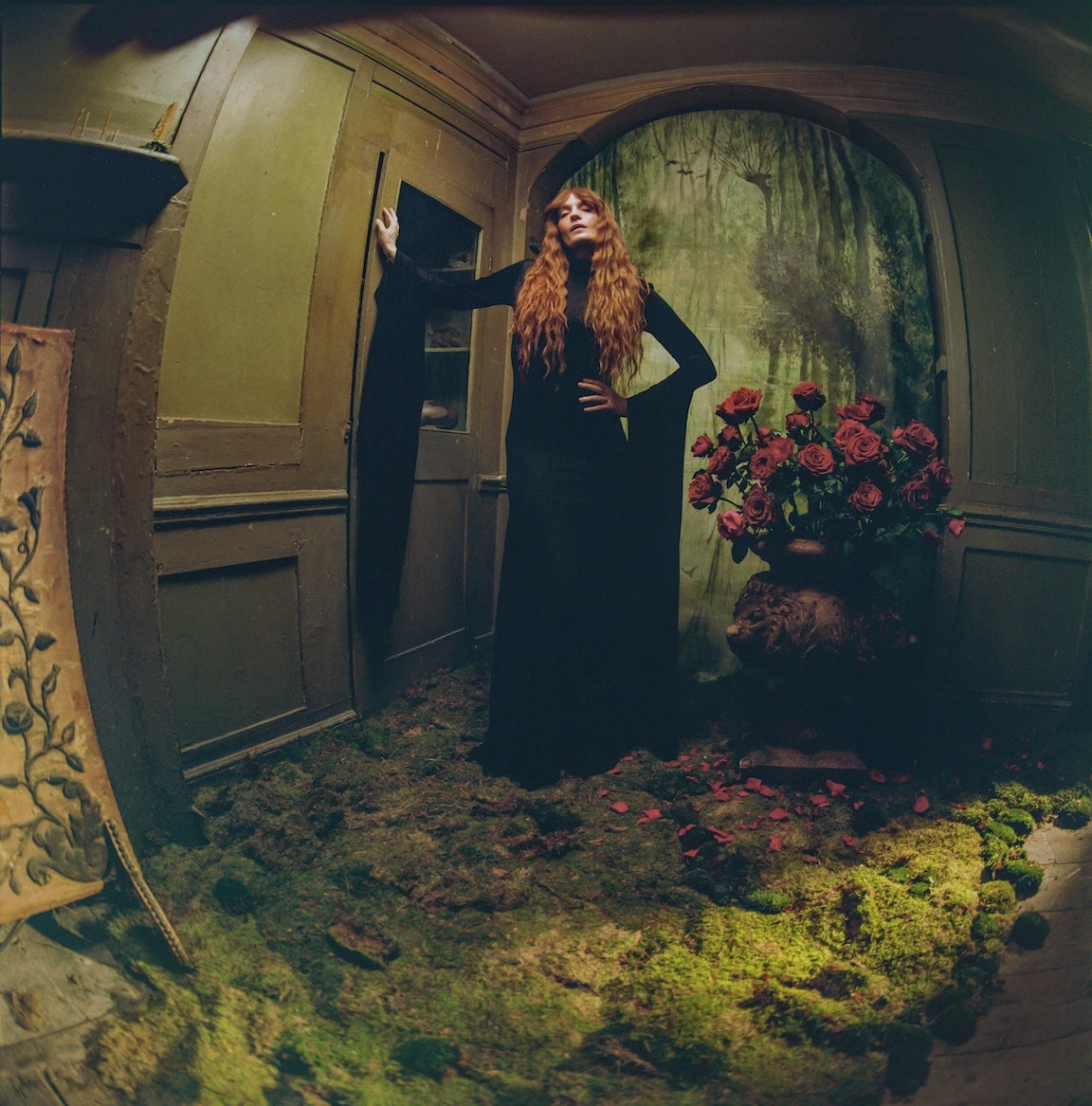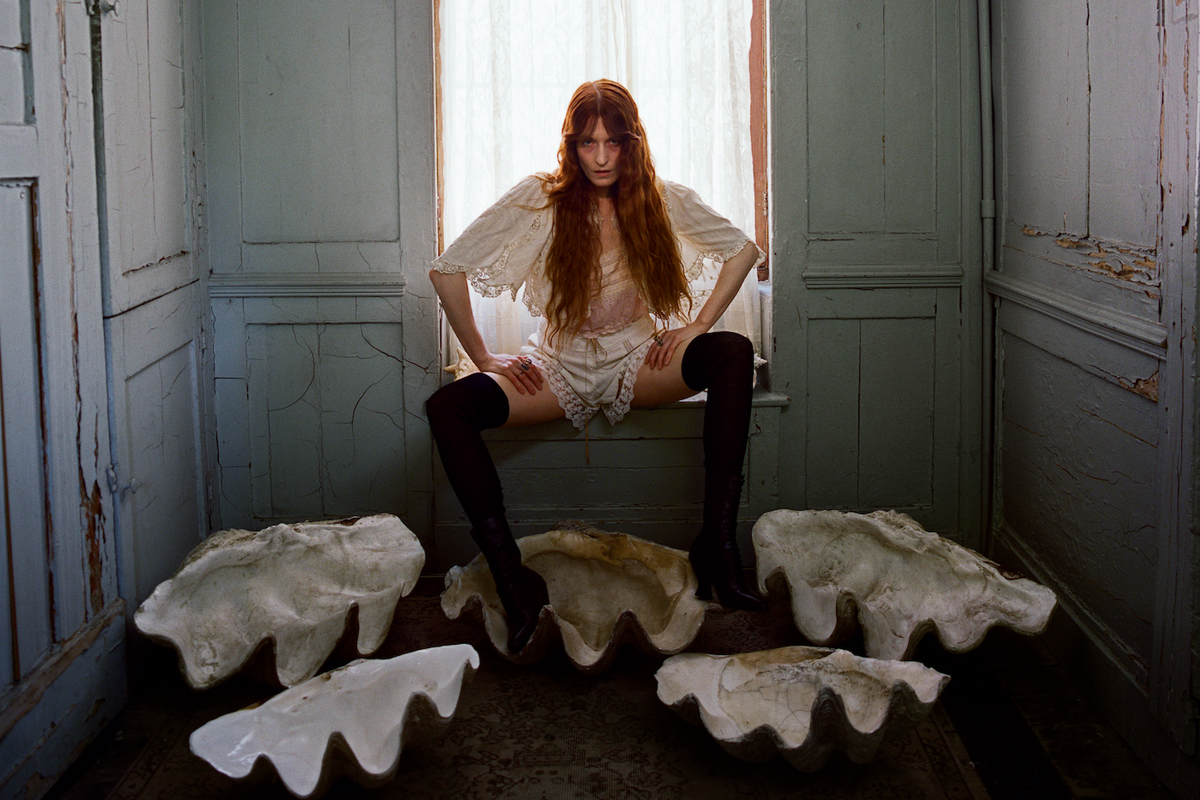Florence Welch was dancing around a stage in a storm, caught in the elements, hundreds of fans screaming for her. So far, so normal. Hours before, though, she had started to bleed heavily; her doctor told her she’d suffered an ectopic pregnancy, a miscarriage. Later, in hospital, it was found that her fallopian tube had ruptured and she had “a Coke can’s worth of blood” in her abdomen.
That experience (as she put it in a recent interview with The Guardian: “The closest I came to making life was the closest I came to death”) provides the inspiration for Florence and the Machine’s sixth album, Everybody Scream. It arrives on Halloween, bristling with all the spellbinding detail, ritual sacrifices and exultant incantations you might expect from Welch.
Title track and album opener “Everybody Scream” begins with a flurry of keys on the Hammond organ, and synths that glimmer and swirl around Welch’s otherworldly calls. The drums kick in, and so does the coven. Banshees shriek in unison as Welch wrestles with her role as performer, personifying fame: “I break down, get up, do it all again/ Because it’s never enough and she makes me feel loved.” On stage, she feels free, almost dangerously so (“Here I can take up the whole of the sky/ Unfurling, becoming my full size”). Welch’s voice climbs like flames on a pyre, all-consuming.
By now, anyone familiar with Florence and the Machine – whether from their spectacular 2009 debut Lungs, or 2022’s pop and disco-influenced Dance Fever – will know how their opulent sound meets songwriting preoccupied by womanhood, obsession, madness and mysticism. Everybody Scream amplifies the latter, perhaps aided by Welch’s actual near-death experience. Everything on this record feels more focused than anything she’s done before. Those usual themes are now homed in on her status both as a famous (female) musician and a woman in her late-thirties, broken and reanimated by such a violent, surely traumatising experience.
She tears away from her would-be captors on “Sympathy Magic”, an unleashing as wild as Cathy running through the moors. “I no longer try to be good/ It didn’t keep me safe/ Like you told me that it would,” she calls over a tremendous pounding of drums and autumnal blast of horns. Her vivid imagination comes to the fore again and again: in “You Can Have It All”, she buries a scream, “And from it grew a bright red tree/ Shining with jagged leaves”. She concocts a witch’s brew on “Perfume and Milk”, imagining herself as Circe in the woods – a study in solitude while the world turns around her.
Mark Bowen from the band IDLES helps to lend an indie-rock sensibility to songs such as “Music By Men”. It plays out over acoustic guitar and soft piano notes, as Welch narrates a ride home from couples’ therapy (“I slide down in my seat so as not to threaten you”). She seems to take aim at men who receive praise by dint of being in a rock band: “Listening to a song by The 1975 I thought ‘f*** it’/ I might as well give music by men a try… Let me put out a record and let it not ruin my life.” There’s a palpable frustration towards the music industry’s double standards: Welch mines the deepest darkest parts of herself and writes it into her art, only to be met with indifference from critics who idolise her male peers.

This bubbling fury is none more evident than on the carefully restrained “One of the Greats”. “I did my best, tried to impress, my childhood dream made flesh,” she sings in a Patti Smith drawl over (meta, mocking) scuzzy electric riffs. “And my dresses and my flowering sadness, so like a woman to profit from her madness.” Later, she ponders to a faceless rock singer: “It must be nice to be a man and make boring music just because you can/ Now don’t get me wrong, I’m a fan/ You’re my second favorite frontman/ And you could have me if you weren’t so afraid of me.” On Dance Fever’s “King”, she unpacked her tumult in choosing between art and starting a family. Everybody Scream feels like she’s channelling her rage at being forced to choose at all.
That this album should arrive a week after Lily Allen’s stunning comeback record, West End Girl, feels decidedly treat, not trick. They are entirely different works, and yet both unfold in similar ways. There’s the exorcism of what was, and what is. But towards the end, we hear both artists reaching some vision of accord, or hoping for it. “Peace is coming,” Welch promises herself on closer “And Love” over ripples of the harp, repeating it like a spell. “Peace is coming.” Consider us bewitched.



